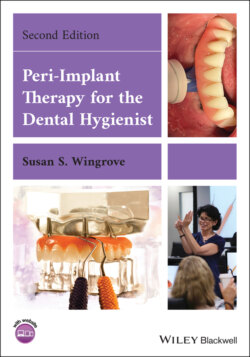Читать книгу Peri-Implant Therapy for the Dental Hygienist - Susan S. Wingrove - Страница 31
Respiratory disease
ОглавлениеRespiratory disease or lung diseases, especially hospital‐acquired pneumonia, are linked to poor dental health (9, 10). To define this link, pulmonary pathogens in plaque are aspirated into the lungs increasing the risk of pneumonia and chronic obstructive pulmonary disease (COPD) (9–12). At greatest risk because of this link are the elderly, especially those in nursing homes. Also, at risk are patients in the hospital, institutional patients, patients with NG tubes, and intubated patients.
Research suggests that bacteria/oral biofilm found in the mouth and throat can be drawn into the lower respiratory tract. These patients can all benefit from good oral hygiene with application of topical chemotherapeutic agents. This includes implant patients with implant‐supported removable overdentures, often implants are overlooked in institutional care facilities without the necessary information on care of dental implants. Treatment for good oral health care can reduce the patient’s risk of fever and fatal aspiration pneumonia.
Rheumatoid arthritis (27), osteoporosis (28), head and neck cancer, pancreatic cancer, kidney disease, and COPD (10, 11) are other proposed connections to periodontal disease that are still being studied. Oral systemic health also has an inferred relationship between periodontal disease and Alzheimer’s (29–31). All these studies are based on the acute phase inflammatory response from periodontal disease or peri‐implant disease that invokes a local and systemic immune response (32). As the oral‐systemic diseases are further defined, dental professionals must consider the impact of periodontal disease and peri‐implant disease (i.e., perimucositis or peri‐implantitis) on the patient’s overall health.
Chair‐side testing kits are now commercially available as an important tool in the new paradigm of oral‐systemic medicine without the need for an additional license or personnel, (see Box 2.2). Many patients do not get physicals on a routine basis. As health professionals, we can screen, monitor, and treat patients more comprehensively by offering chair‐side testing. Medical billing can also help your practice offer more comprehensive testing, monitoring, and treatment plans with decreased out‐of‐pocket costs for the patient.
The entire team needs to be educated on any tests your office will be providing. Obtain brochures and establish a system to identify which patients need to be tested. Patients with risk factors, heart disease, periodontal disease, and diabetes are prime candidates. For patient’s treatment planning on implants or bone and tissue grafting procedures, a CRP, vitamin D, and if the patient is diabetic HbA1c testing. For diabetics, you can provide HbA1c tests at each maintenance visit or once yearly as a quality service to provide for these patients. If a patient has periodontal disease or heart disease a CRP and/or vitamin D test could be considered.
In the United States, 50–75% of all adults have a vitamin D deficiency which is associated with dental treatment complications such as healing after implant or soft tissue surgeries (33). It is also an indicator of potential health risks of systemic diseases including heart disease, strokes, diabetes, and even cancer.
For implant dentistry, the Vitamin D test can also be a key factor for linking innate and adaptive immunity. Together with excess LDL, cholesterol (dyslipidemia) can cause slower bone metabolism and a decrease in dental implant osseointegration. Therefore, a deficiency in vitamin D can slow implant osseointegration and increase the risk of graft infection (34). The recommended daily intake of vitamin D is now, 600–800 IU daily to meet nutritional needs, increased from 400 IU per day. Research in a double‐blind, randomized clinical trial in Calgary, Canada by Dr. Laureen Burt showed that individuals taking 10,000 IU a day had lower bone mineral densities and increased bone resorption compared to individuals taking 400 IU per day (35).
Vitamin D testing and recommendation of supplements are now a consideration before and after implant placement for patients with poor wound healing in previous dental surgeries and in coordination with their medical physicians.
It is important to remember when discussing oral health and risk factors with your patients that having an infection in the oral cavity does not mean the patient is now going to suffer a heart attack or stroke. Rather, these systemic disorders are considered as complex diseases with multiple risk factors contributing to the patient’s overall health risk. As dental professionals, we need to provide comprehensive care for our patients for their overall health which may postpone the risk for certain systemic diseases (36). Stay up to date on all the latest research coming out the oral‐systemic connection to provide optimal care for your patients.
